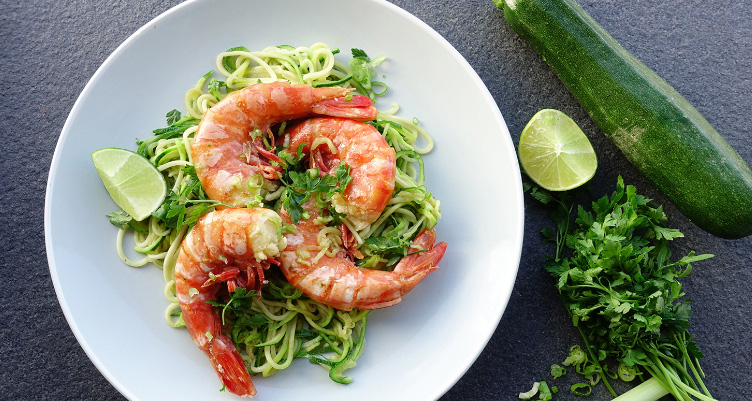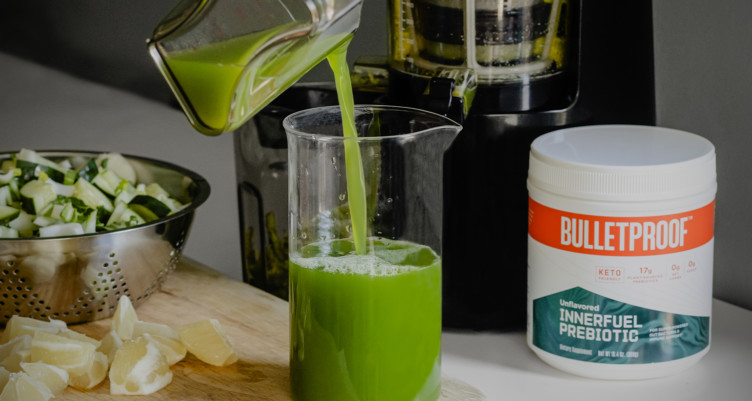Longer Fasting on Keto for Self-Growth

- Fasting isn’t just a new fitness fad… it’s a practice that’s been used for centuries for both religious and health-driven reasons.
- Combining the keto diet with fasting is a great way to amplify the health benefits of both practices, including improved insulin sensitivity and blood sugar control.
- When you’re finally ready to break your fast, Bulletproof products can be incorporated for a supportive boost!
Intermittent fasting may have exploded in popularity in recent years thanks to the health and fitness community, but the practice of fasting has actually been around for much, much longer. But while it has long been part of various religions, research has shown that fasting brings several health benefits. As such, you’ll find more and more people today who implement this concept in some form or fashion.
Of course, the ketogenic diet has also grown in popularity over time. And, like limiting your eating window, following this high-fat, low-carb diet can help with the moderation of blood sugar levels, appetite control and weight management—when practiced safely and under the supervision of a health care provider.
Let’s take a closer look at how fasting works, how it fits in with a keto lifestyle and how Bulletproof recipes and products can support you, once your fasting period has come to a close.
A brief history of fasting

Contrary to popular belief, going a period of time without eating isn’t a new idea brought on by the wave of fitness influencers. Actually, fasting has existed for thousands of years…
Ancient civilizations and religious groups have implemented this practice for various reasons. From preparing to approach deities to using it as a form of penitence, people have engaged in short-term fasts for centuries.
While there are certainly some folks who fast as part of their religion, more people have opened up to the idea of a ‘fasting window’ for the potential health benefits.
So why might someone want to only eat during a certain time frame?
For one, fasting can help usher along autophagy, which is one of your body’s natural detoxification processes.[1] Plus, when overseen by a physician, fasting can also help with weight management, blood sugar control, and even support healthy aging.
Of course, the practice of fasting isn’t just a one-size-fits-all model. While intermittent fasting (IF) is the most popular method, there are other ways to implement this eating pattern. From dry fasts (no food or water) to wet fasts (where water and other basic beverages are allowed), there are different ways to incorporate fasting into your lifestyle.
Related: The Complete Intermittent Fasting Guide for Beginners
Fasting for self-growth

If you’ve never tried working in a fasted state, you may want to give it a shot. After all, improved cognitive function is one of the research-backed benefits of fasting.[2] While in a fasted state, glucose levels get reduced, but the metabolism of ketone bodies is much more efficient, which is why followers of a low-carb, high-fat diet (like keto) are especially hip to the concept.
So, why else might you want to commit to the practice of fasting?
In one mice study, researchers found that hippocampus-related learning and memory improved with intermittent fasting due to reduced oxidative stress in the brain.[3]
In addition, fasting may also help improve immune system function. In fact, one study showed that a prolonged fast of at least three days helped “reset” some components of the immune system.[4]
Who should not fast?
Wondering how long is it safe to fast? Stop right there. Some people should not fast at all. First and foremost, always talk to your doctor before engaging in the practice of fasting. It’s important to discuss any preexisting health conditions you may have that could be affected by reducing your eating window.
While fasting may provide benefits to some, it is not for everyone.
If you are pregnant, breastfeeding, elderly, have a history of disordered eating or have a chronic health condition, such as type 2 diabetes or heart disease or high cholesterol, consult with your health provider, and discuss supervised fasting before introducing either IF or longer fasts (or both) into your life.
Can you fast while following the keto diet?

Restricting your carbohydrates and upping your fat intake are the basic principles of the keto diet. However, you can actually enter ketosis thanks to the power of fasting!
Going on a 24-hour fast before you start the keto diet can actually put your body in a state of ketosis. During that period, your body will burn through its glucose reserves, which will set you up to begin burning body fat and dietary fat for fuel. And when you fast, the production rate and concentration of ketone bodies rises significantly before it reaches a plateau by the fifth day.[5]
Once your body has made that metabolic switch during that fasting period, you can then start eating low-carb foods slathered in keto-friendly fats, like Bulletproof Brain Octane C8 MCT Oil and Bulletproof Grass-Fed Ghee, that will continue to ramp up and support your body’s ketone production.
In short, keto and fasting are practices that complement each other well.
IF is certainly the most popular version of fasting, and there are various ways to make this a part of your lifestyle. Some opt for a 5:2 plan that includes five days of typical Bulletproof Coffee and keto meals and two days of reducing your calorie intake to 500-600 calories. Another popular method is 16:8, whereby you only eat keto food during an eight-hour period each day. Additionally, there’s alternate-day fasting, which enforces 36 hours of fasting, followed by a 12-hour eating window.
However, longer fasts (while naturally increasing ketosis), which especially need to be done under medical supervision, can actually activate more benefits. A 2019 study that observed the effects of prolonged fasting showed several major health benefits, including[6]:
- Reduced body weight
- Lower blood pressure
- Decreased blood lipid levels
- Reduced insulin levels
- Reduced blood sugar levels
- Increased ketone levels
- Autophagy
Overall, combining fasting with a well-structured keto diet plan may amplify the effects and benefits of using fat for fuel!
The benefits of longer fasts
 Fasting comes in many different forms. Some people go 16 hours without eating before they consume anything. Others may undergo complete calorie restriction for days at a time!
Fasting comes in many different forms. Some people go 16 hours without eating before they consume anything. Others may undergo complete calorie restriction for days at a time!
Along with entering ketosis, during the first 24 hours of fasting, your body can undergo some significant changes. For example, gluconeogenesis is stimulated during fasting, which increases the number of calories your body burns.[7] (Short-term fasting also helps usher in ketosis, though, as your body depletes its glycogen stores.)
Moreover, a 48-hour fast may ramp things up further by helping to improve insulin sensitivity while also boosting the autophagic process.[8]
How long is it safe to fast if you want to explore this tactic for several days? Longer fasts (72 hours or more) may introduce even more health benefits, especially when it comes to ketone production and reducing blood glucose levels. The 2019 study cited above even showed that subjects experienced an increase in physical and emotional well-being by engaging in prolonged fasting. (As a friendly reminder, we recommend always working with your doctor if you want to try out a prolonged fast.)
How to graduate from IF to longer fasts
If your doctor has given you the okay to delve into longer fasting territory from IF, you may be wondering how to go about it. Here are some tips you can follow to help transition safely from IF to longer fasts:
- Plan ahead and set realistic goals: In trying to decide on the length of your fast, consider upcoming holidays or special events, as this could affect the timing of when you begin your fast. And remember: Start with something that feels manageable to you.
- Fuel up with black coffee: If you’re following a wet fast, plainly brewed coffee is typically acceptable. (We promise, you won’t miss any of those coffee shop add-ins once you take a sip of clean Bulletproof Coffee—made from our grounds or whole beans, and this time, sans the quality fats we’re famous for).
- Stay hydrated: Make sure to drink water throughout the day as your body begins its natural detoxification process. Certain unsweetened teas may also be helpful to your journey.
- Exercise, if you feel up to it: Although it may seem counterintuitive, fasting actually ramps up human metabolism, according to a recent study.[9] So, while mentally you may not feel up for physical activity, your body may actually tolerate a decent amount of movement.
- Listen to your body: Integrating fasting into your life will (hopefully) allow you to get a better understanding of what it actually means to be hungry. That way, you will know whether to push through a longer fast or to end it if you feel you’re in need of some immediate sustenance.
Pro tip: Although caloric intake is more or less prohibited during a long fast, some doctors and nutritionists recommend a serving of bone broth, which is full of electrolytes, to help you sustain a longer fast.
Tips for breaking a longer fast on keto

If fasting for longer than 24 hours, it’s important to slowly reintroduce nutrients into your body. You don’t want to load your digestive system with too much after going more than a day without eating. (If not careful, you could experience some unwanted cramping or discomfort if you eat large or complex meals.)
So what’s the best way to break a longer fast on keto?
Start with simple foods that your body can easily digest. If you know a particular food gives you trouble, it’s best to avoid it at this time. Instead, go for lighter options like veggies, lean proteins, broths, and soups that won’t be difficult on your digestive system.
Break your fast with these keto-friendly Bulletproof recipes

Looking for some delicious (and nutritious) ways to break your fast and get your energy levels up?
These Bulletproof-backed recipes not only taste great, but also make use of ingredients and products that will help you ease out of your fast and help unlock the health benefits we discussed earlier.
1. Low-Carb Angel Hair Shirataki With Lemon Chicken
This low-carbohydrate dish will tantalize your taste buds with a zesty lemon butter sauce that’s brought together perfectly, thanks to Bulletproof Collagelatin.
2. Keto Shrimp Scampi
Packed with flavor and adequate protein, this incredibly simple dish gets a nice boost of quality fats from Bulletproof Grass-Fed Ghee.
3. Poached Cod in Tomato Broth
Instead of avocado oil, try using Bulletproof C8 and C10 MCT Oil to get your tomatoes, stock and spices simmering before you carefully poach your cod for this guilt-free, comforting bowl of soup.
4. Keto Chopped Salad with Quick Creamy Dressing
The creamy dressing that accompanies this keto-friendly salad provides a dose of quality fats, thanks to Bulletproof Brain Octane C8 MCT Oil.
5. Keto Iced Coffee Protein Shake
This easy-to-make shake includes a scoop of Bulletproof Vanilla Collagen Protein for added hair, nail and skin support as you break your fast.
Related: Easy Keto Breakfast Recipes With 10 Carbs or Less
How Bulletproof supplements can support you—post-fast

Make sure that you avoid taking any supplements during your fast. Not only can they impact autophagy, but they may also not digest well if you don’t have food in your system. (Additionally, work with your doctor if you are taking medication to find out how that impacts your long fasting goals.)
However, after you break a longer fast with a hearty, nutritious meal, consider adding these keto-friendly supplements to your stack to help your body recover:
- Bulletproof Energy Collagen Protein: An all-in-one formula that provides sustained energy, this protein powder packs a full essential amino acid profile.
- Bulletproof Collagen Protein: Replenish glycine and give your body the building blocks it craves for healthy skin, joints and bones.†
- Bulletproof InnerFuel Prebiotic: Feed the beneficial bacteria in your gut with this beneficial prebiotic.†
- Bulletproof Gut Health: Nourish your microbiome with the probiotic in this product, which also contains grass-fed collagen protein for added support.†
- Bulletproof Sleep Mode: If you’re amped up from fasting, this natural, melatonin-based sleep supplement can help you relax and wind down to catch some quality zzzs.†
The bottom line: There are different ways to incorporate fasting into a ketogenic lifestyle in order to take advantage of the associated health benefits of both practices. And once you break your fast, make sure to feed your body the nutrients it needs (with a little help from Bulletproof) in order to recover and get ready to tackle whatever’s in your path!
Supplements can provide even more support on your keto journey. Find out which ones to incorporate—especially if you’re following keto to meet weight management goals.
Sign up for early access to sales, product launches, the latest Bulletproof news and more!



